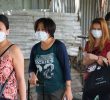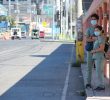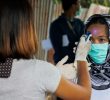DAVAO CITY, Philippines – Various groups slammed the new directive issued by the Interagency Task Force on Emerging and Infectious Diseases (IATF-EID) which authorizes the Philippine National Police (PNP) to conduct a house-to-house search for new Coronavirus (COVID-19) patients who either are asymptomatic or have mild symptoms.
The Alliance of Concerned Teachers (ACT) partylist likened the directive to “tokhang”, citing the PNP’s record on human rights violations during the flagship anti-drug war of the Duterte administration when thousands were arrested and killed for allegedly resisting apprehension.
“Interior Secretary Eduardo Año’s COVID tokhang directive for cops to do a house-to-house search for mild and asymptomatic COVID-19 patients under home quarantine and transfer them to isolation facilities does not even jive with DOH directives to home quarantine mild and asymptomatic patients so as not to add more to the already overwhelmed hospitals and healthcare workers,” said France Castro, representative of ACT partylist and assistant minority leader at the House of Representatives.
The lawmaker raised the possibility of police personnel becoming COVID-19 “super spreaders” due to the lack of medical training and knowledge.
Department of Interior and Local Government Secretary Eduardo Año, in his July 15 statement, clarified that local health workers will lead “Oplan Kalinga” and the police would only support and assist local government units in the search.
Oplan Kalinga is a program launched by the national government by providing isolation and quarantine facilities to COVID-19 patients who are unable to observe the proper home quarantine protocols or for those who have household members who are elderly, with existing diseases and pregnant women.
The IATF has discouraged home quarantine to COVID-19 patients to minimize the risk of transmission within households.
Año said Republic Act 11332, the “Mandatory Reporting of Notifiable Diseases and Health Events of Public Health Concern Act”, would encourage protecting the people from public health threats if it’s done in collaboration with law enforcement entities.
However, Cure Covid Spokesperson Dr. Julie Caguiat said allowing state forces to be COVID-19 contact tracers is a direction towards the worse.
The people’s initiative group explained that the past four months dealing with the pandemic, the public’s fear and uncertainty have been fueled more by the “shock and awe” style of the military and police.
Caguiat pointed out the failure of the militaristic lockdown in curbing the rising number of COVID-19 cases in the country. On July 15, the number of cases in the Philippines surged to 58,850 after the Department of Health (DOH) reported 1,392 new infections.
“Communication and a comforting presence on the ground are very important. Mobilizing health manpower and the community itself will give the people a better sense of security instead of increased military and police presence in full battle gear,” the Cure Covid noted.(davaotoday.com)










